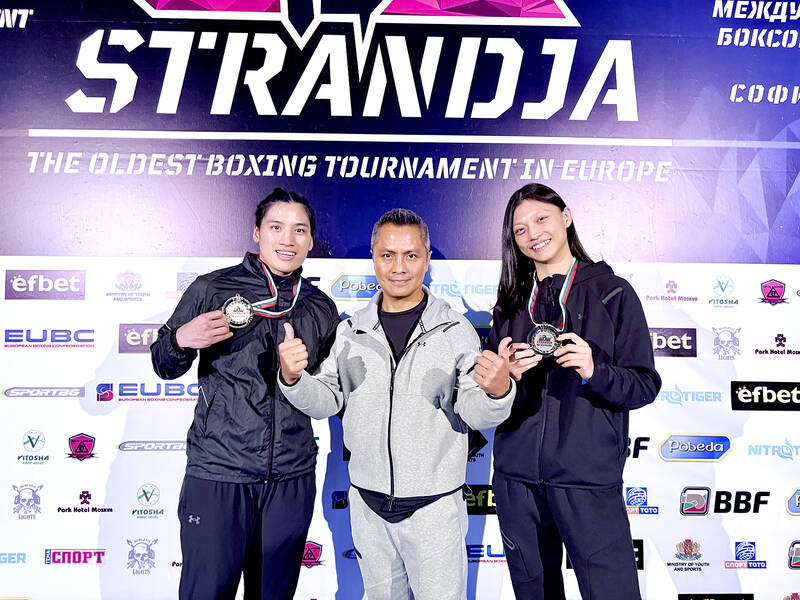Taiwanese female boxers Chen Nien-chin (陳念琴) and Wu Shih-yi (吳詩儀) on Sunday clinched gold medals in their respective weight divisions at this year’s International Boxing Tournament (Strandja) in Bulgaria.
Competing in the women’s 70kg division, 27-year-old Chen, who won bronze at the Paris Olympics last year, defeated Elisavet Konstantinidou of Greece 4-0 in the final to win gold.
The victory marked Chen’s first gold medal at an international competition this year.

Photo courtesy of Ko Wen-ning via CNA
Meanwhile, Paris Olympic bronze medalist Wu also won gold after beating Aidana Zabynbekova of Kazakhstan 4-0 in the women’s 57kg division.
Ko Wen-ming (柯文明), the team’s coach, praised the performance of the boxers, adding that the gold medal wins certainly help boost their confidence as they are competing in different weight classes this year.
Despite the change, they still managed to come out victorious, Ko said.
Chen and Wu competed in the 66kg and 60kg divisions respectively at the Paris Olympics.
Ko praised Wu for keeping her composure as the Kazakh boxer clinched and threw punches wildly, but, fortunately, Wu had enough experience to counter her opponent.
Chen, despite facing a formidable fighter, still came out on top, he said.
“Although Nien-chin won the gold medal, she still didn’t fully execute some of the strategies and punches we planned before the bout. There is still room for improvement,” Ko said.
The 76th edition of the Strandja, which is the oldest international boxing tournament in Europe, closed on Sunday.
Ko said the two boxers would return to Taiwan before heading off to participate in an event organized by World Boxing at the end of this month.

Taiwan is projected to lose a working-age population of about 6.67 million people in two waves of retirement in the coming years, as the nation confronts accelerating demographic decline and a shortage of younger workers to take their place, the Ministry of the Interior said. Taiwan experienced its largest baby boom between 1958 and 1966, when the population grew by 3.78 million, followed by a second surge of 2.89 million between 1976 and 1982, ministry data showed. In 2023, the first of those baby boom generations — those born in the late 1950s and early 1960s — began to enter retirement, triggering

One of two tropical depressions that formed off Taiwan yesterday morning could turn into a moderate typhoon by the weekend, the Central Weather Administration (CWA) said yesterday. Tropical Depression No. 21 formed at 8am about 1,850km off the southeast coast, CWA forecaster Lee Meng-hsuan (李孟軒) said. The weather system is expected to move northwest as it builds momentum, possibly intensifying this weekend into a typhoon, which would be called Mitag, Lee said. The radius of the storm is expected to reach almost 200km, she said. It is forecast to approach the southeast of Taiwan on Monday next week and pass through the Bashi Channel

NO CHANGE: The TRA makes clear that the US does not consider the status of Taiwan to have been determined by WWII-era documents, a former AIT deputy director said The American Institute in Taiwan’s (AIT) comments that World War-II era documents do not determine Taiwan’s political status accurately conveyed the US’ stance, the US Department of State said. An AIT spokesperson on Saturday said that a Chinese official mischaracterized World War II-era documents as stating that Taiwan was ceded to the China. The remarks from the US’ de facto embassy in Taiwan drew criticism from the Ma Ying-jeou Foundation, whose director said the comments put Taiwan in danger. The Chinese-language United Daily News yesterday reported that a US State Department spokesperson confirmed the AIT’s position. They added that the US would continue to

The number of Chinese spouses applying for dependent residency as well as long-term residency in Taiwan has decreased, the Mainland Affairs Council said yesterday, adding that the reduction of Chinese spouses staying or living in Taiwan is only one facet reflecting the general decrease in the number of people willing to get married in Taiwan. The number of Chinese spouses applying for dependent residency last year was 7,123, down by 2,931, or 29.15 percent, from the previous year. The same census showed that the number of Chinese spouses applying for long-term residency and receiving approval last year stood at 2,973, down 1,520,